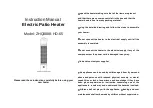
180-CL2118.IPI.1 v1.00
August 5, 2020
Page 37
CL2118.IPI.1
INSTALLATION
VENTING
This appliance will not function without being connected to a proper venting system. This unit is certified for
use with M&G Duravent, BDM, American Metal, Selkirk (Direct-Temp), Olympia, and ICC venting. Read the
manufacturer’s installation instructions before installing the venting system.
Typical Installation
- 24”(min) vertical vent pipe on top of the appliance,
- One 90° elbow, and up to 24” (max) horizontal run to the outside (with a 2’ vertical rise).
Other installations
•
Up to 4 - 90° elbows, or equivalent, maximum.
•
Minimum 2’ (610 mm) straight length between bends.
•
The total vertical height up to 36’ (10.97 m) maximum.
•
Use vent restrictor on vents from 15’ (4.57 m ) to 20’ (6.09 m) to obtain optimal flame appearance, see
“VENT RESTRICTOR” and “BURNER FLAME APPEARANCE”
•
The total horizontal run up to 20’ (6.09 m) maximum.
•
Note: 2’ (0.6m) minimum of vertical height required.
•
All rear vent applications require a listed snorkel termination.
NOTE: Maximum vent lengths may be subject to local codes.
For best venting performance, here are some general venting rules:
1.
Use only vent systems and components certified for use with this appliance.
2.
Maintain a minimum of 1” (26 mm) clearance to combustibles from the outside surfaces of vertical
vents and minimum of 1” (26 mm) from bottom, 2 1/2” (64 mm) from sides, and 13” (330 mm) from
top surfaces of horizontal vents. Always use a wall thimble when passing through combustible
construction.
3. Observe all local code restrictions, if any, regarding the installation of this type of gas appliance.
4. Observe the vent height and length restrictions given in this manual.
5. Never slope horizontal vents downwards.
6.
Maintain at least an upward slope of 1/4” (7 mm) for every 1 ft (305 mm) of horizontal vent.
7.
Terminate the vent with a termination certified for use with this appliance.
8. Support horizontal vent every 3 ft (915 mm) to prevent it from sagging.
9. Ensure proper reassembly and resealing of the vent-air intake system when venting is installed,
inspected, or replaced.
















































